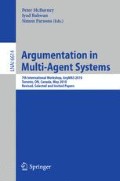Abstract
The use of virtual agents to intelligently interface with online customers of e-commerce businesses is remarkably increasing. Most of these virtual agents are designed to assist online customers while searching for information related to a specific product or service, while few agents are intended for promoting and selling a product or a service. Within the later type, our aim is to provide proactive agents that recommend a specific item and justify this recommendation to a customer based on his purchases history and his needs. In this paper, we propose a dialectical argumentation approach that would allow virtual agents that have sales goals to trigger persuasions with e-commerce’s customers. Then, we illustrate the proposed idea through its integration with an example from real-life.
Categories and Subject Descriptors
I.2.11 [Artificial Intelligence:] Intelligent Agents.
General Terms: Algorithms.
Access this chapter
Tax calculation will be finalised at checkout
Purchases are for personal use only
Preview
Unable to display preview. Download preview PDF.
References
Hof, R., Green, H., Himmelstein, L.: Now it’s YOUR WEB. BusinessWeek, 68–75 (1998)
Poong, Y., Zaman, K.-U., Talha, M.: E-commerce today and tomorrow: a truly generalized and active framework for the definition of electronic commerce. In: Proc. of the 8th International Conference on Electronic Commerce (ICEC), pp. 553–557. ACM, Fredericton (2006)
Palopoli, L., Rosaci, D., Ursino, D.: Agents’ roles in B2C e-commerce. AI Communications 19, 95–126 (2006)
Wooldridge, M., Jennings, N.: Intelligent agents: Theory and practice. Knowledge Engineering Review 10, 115–152 (1995)
Isbister, K., Doyle, P.: Design and evaluation of embodied conversational agents: A proposed taxonomy. In: Proc. of the First International Joint Conference on Autonomous Agents and Multi-Agent Systems (AAMAS), Budapest, Hungary (2002)
Rist, T., André, E., Baldes, S., Gebhard, P., Klesen, M., Rist, P., Schmitt, M.: A review of the development of embodied presentation agents and their application fields. In: Life-Like Characters – Tools, Affective Functions, and Applications, pp. 377–404. Springer (2003)
Morge, M.: The hedgehog and the fox. In: Rahwan, I., Parsons, S., Reed, C. (eds.) Argumentation in Multi-Agent Systems. LNCS (LNAI), vol. 4946, pp. 114–131. Springer, Heidelberg (2008)
Morge, M., Mancarella, P.: Assumption-based argumentation for the minimal concession strategy. In: McBurney, P., Rahwan, I., Parsons, S., Maudet, N. (eds.) ArgMAS 2009. LNCS, vol. 6057, pp. 114–133. Springer, Heidelberg (2010)
Roberts, F., Gülsdorff, B.: Techniques of dialogue simulation. In: Pelachaud, C., Martin, J.-C., André, E., Chollet, G., Karpouzis, K., Pelé, D. (eds.) IVA 2007. LNCS (LNAI), vol. 4722, pp. 420–421. Springer, Heidelberg (2007)
Ferguson, J.A.G.: Mixed-initiative systems for collaborative problem solving. AI Magazine 28, 23–32 (2007)
Rich, C., Sidner, C.L., Lesh, N.: COLLAGEN applying collaborative discourse theory to human-computer interaction. AI Magazine 22, 15–25 (2001)
Sadek, D.: Artemis Rational Dialogue Agent Technology: An Overview. In: Multi-Agent Programming, pp. 217–225. Springer, Heidelberg (2005)
Grosz, B.J., Sidner, C.L.: Plans for Discourse. In: Cohen, Morgan, Pollack (eds.) Intentions and Plans in Communication and Discourse. MIT press, Cambridge (1990)
Rao, A.S., Georgeff, M.P.: Modeling rational agents within a BDI-architecture. In: Proc. of the 2nd International Conference on Principles of Knowledge Representation and Reasoning (KR), pp. 473–484. Morgan Kaufmann publishers Inc., San Mateo (1991)
C, F.T.: FIPA ACL Communicative Act Library Specification. Component, Foundation for Intelligent Physical Agents (2002), http://fipa.org/specs/fipa00037/
Breiter, P.: La communication orale coopérative : contribution à la modélisation et à la mise en œuvre d’un agent rationnel dialoguant. PhD thesis, Université de Paris Nord (1992)
Hamblin, C.L.: Fallacies. Methuen (1970)
Walton, D., Krabbe, E.: Commitment in Dialogue. SUNY Press (1995)
Prakken, H.: Formal systems for persuasion dialogue. The Knowledge Engineering Review 21, 163–188 (2006)
Amgoud, L., Cayrol, C.: On the acceptability of arguments in preference-based argumentation. In: Proc. of UAI, pp. 1–7. Morgan Kaufmann, Wisconsin (1998)
Dung, P.M.: On the acceptability of arguments and its fundamental role in nonmonotonic reasoning, logic programming and n-person games. Artif. Intell. 77, 321–357 (1995)
Amgoud, L., Prade, H.: Using arguments for making and explaining decisions. Artificial Intelligence Journal 173(3-4), 413–436 (2009)
Bench-Capon, T., Prakken, H.: Justifying actions by accruing arguments. In: Proc. of the 1st International Conference on Computational Models of Argument, pp. 247–258. IOS Press, Amsterdam (2006)
Kakas, A., Moraitis, P.: Argumentative-based decision-making for autonomous agents. In: Proc. of AAMAS, pp. 883–890. ACM Press, New York (2003)
Gartner, D., Toni, F.: CaSAPI: a system for credulous and sceptical argumentation. In: Proc. of ArgNMR, pp. 80–95 (2007)
García, A.J., Simari, G.R.: Defeasible logic programming: an argumentative approach. Theory and Practice of Logic Programming 4(2), 95–138 (2004)
Demetriou, N., Kakas, A.C.: Argumentation with abduction. In: Proc. of the 4th Panhellenic Symposium on Logic (2003)
Author information
Authors and Affiliations
Editor information
Editors and Affiliations
Rights and permissions
Copyright information
© 2011 Springer-Verlag Berlin Heidelberg
About this paper
Cite this paper
Morge, M., Abdel-Naby, S., Beaufils, B. (2011). Towards a Dialectical Approach for Conversational Agents in Selling Situations. In: McBurney, P., Rahwan, I., Parsons, S. (eds) Argumentation in Multi-Agent Systems. ArgMAS 2010. Lecture Notes in Computer Science(), vol 6614. Springer, Berlin, Heidelberg. https://doi.org/10.1007/978-3-642-21940-5_9
Download citation
DOI: https://doi.org/10.1007/978-3-642-21940-5_9
Publisher Name: Springer, Berlin, Heidelberg
Print ISBN: 978-3-642-21939-9
Online ISBN: 978-3-642-21940-5
eBook Packages: Computer ScienceComputer Science (R0)

